Key takeaways
- BBC UK movie reviews effectively blend emotional analysis with factual insight, helping viewers form their own opinions about films.
- The adaptation of The Father captures the experience of memory loss and its impact on identity, offering a profound examination of familial love and caregiving challenges.
- Cinematic techniques in The Father, such as disorienting spatial shifts and fragmented editing, enhance the portrayal of dementia and immerse the audience in the protagonist’s experience.
- The performances, particularly by Anthony Hopkins, illustrate the power of subtlety in conveying deep emotional struggles, emphasizing the importance of nuance in storytelling.
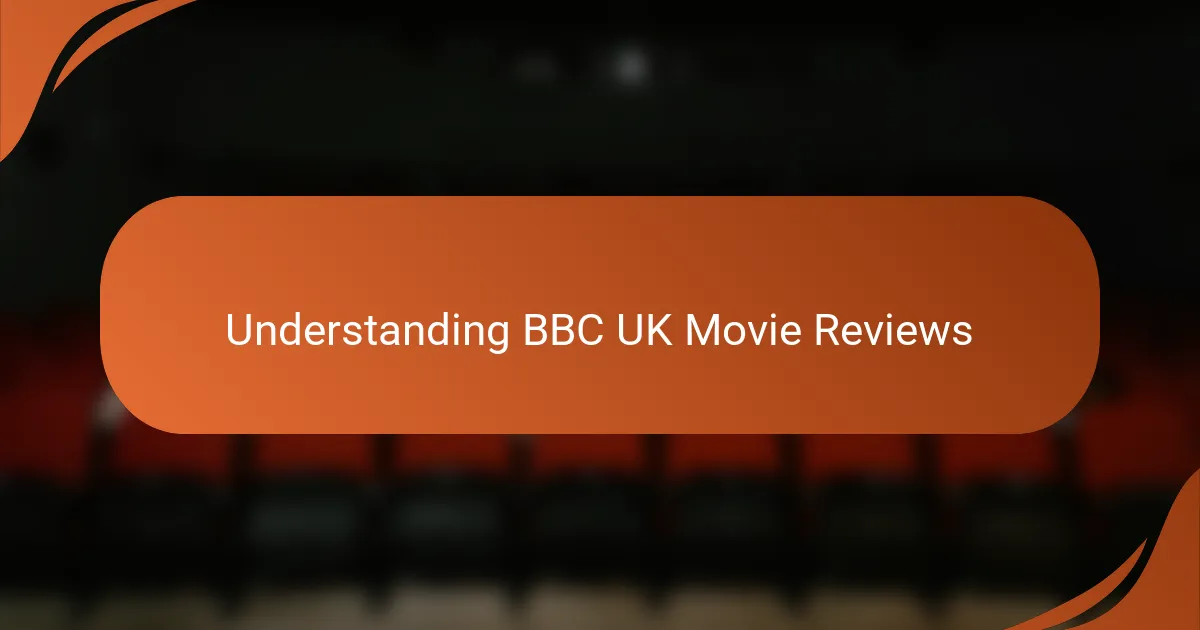
Understanding BBC UK Movie Reviews
When I first started exploring BBC UK movie reviews, I noticed how they blend in-depth analysis with a straightforward tone. It feels like having a knowledgeable friend break down the storyline and performances without overwhelming you. Have you ever found yourself stuck deciding whether a film is worth your time? That’s exactly where these reviews come in handy for me.
What stands out to me is how BBC reviews often capture the emotional core of a movie, not just its technical merits. They tap into the feelings a film evokes, which helps me connect on a deeper level before watching. Don’t you think understanding a movie’s emotional impact can shape the whole viewing experience?
BBC UK reviews also maintain a fine balance between opinion and fact, something I really appreciate. They don’t just tell you what to think but guide you to form your own opinion. This approach resonates with me—after all, movies mean something different to everyone, right?
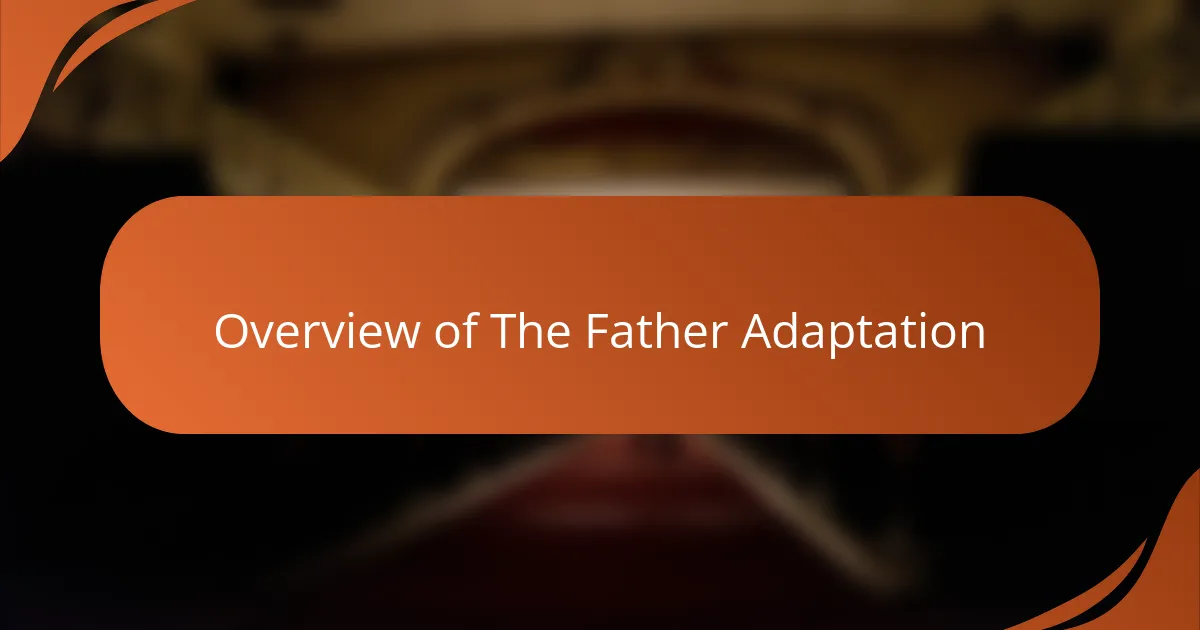
Overview of The Father Adaptation
The Father adaptation captured my attention immediately by how it translates a deeply intimate stage play into a compelling cinematic experience. I was struck by the way the film uses its structure to put the audience inside the protagonist’s mind, making confusion and memory loss feel very real. Have you ever watched something that made you experience a character’s reality so viscerally? That’s exactly what this adaptation achieves.
What I find particularly powerful is the casting—Anthony Hopkins delivers a nuanced performance that feels both heartbreaking and authentic. From my perspective, the adaptation respects the original play’s intent while expanding its emotional reach through dynamic visuals and pacing. It’s like the film invites you to walk alongside the character’s unraveling world, doesn’t it?
In reflecting on this adaptation, I also appreciate how it balances moments of tenderness with the harshness of decline. The Father doesn’t shy away from discomfort, yet it never feels exploitative. Instead, it offers honest insight into a challenging subject that I think many of us find difficult to confront. Isn’t it refreshing when a film can handle such themes with both empathy and rawness?
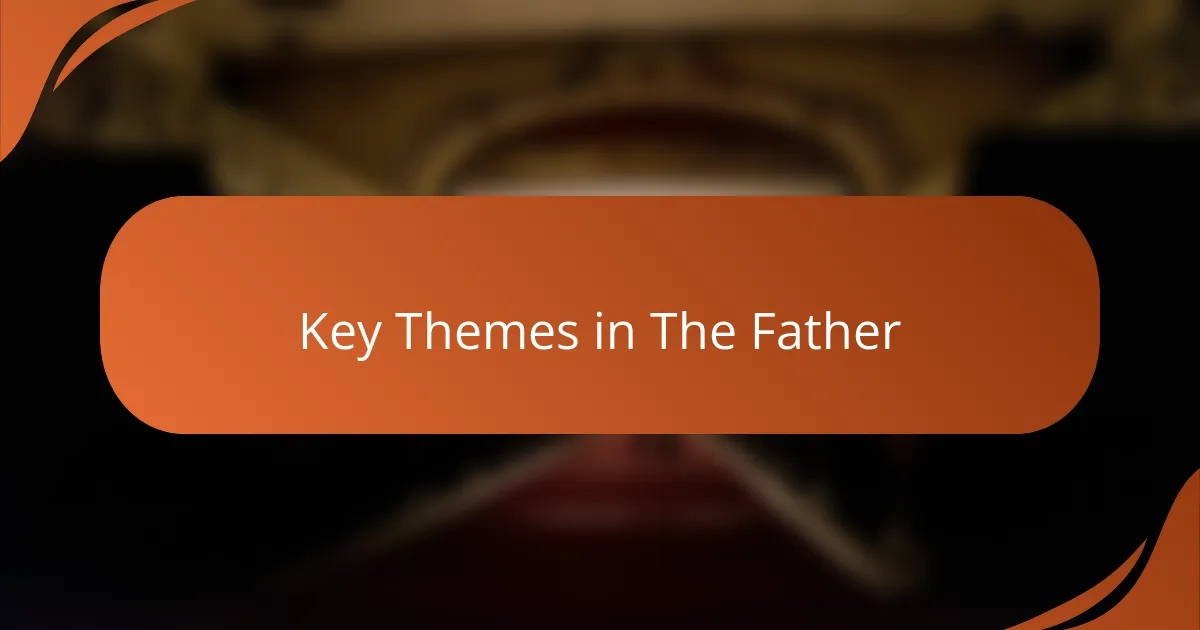
Key Themes in The Father
One of the most striking themes in The Father is the experience of memory loss and how it distorts reality. From my own experience with family members facing dementia, I found the film’s portrayal painfully authentic—it captures that unsettling feeling of not knowing what’s real or what’s imagined. Have you ever struggled to explain something that seems clear to you but confusing to someone else? That disorientation is at the heart of this story.
Another theme that really resonated with me is the shifting nature of identity. The Father shows us how memory shapes who we are and how fragile that sense of self can become. Watching this unfold, I was reminded of how much our past and present are intertwined—and losing that connection feels like losing a part of yourself. It made me question, how would I cope if my own memories started slipping away?
Lastly, the film dives deep into themes of love, care, and loss—the complicated emotions that family members experience when watching a loved one decline. There’s tenderness wrapped in frustration and moments of joy shadowed by pain. I couldn’t help but reflect on how love can persist even when communication breaks down and how important compassion is in those moments. Don’t you think that’s what makes The Father so profoundly moving?
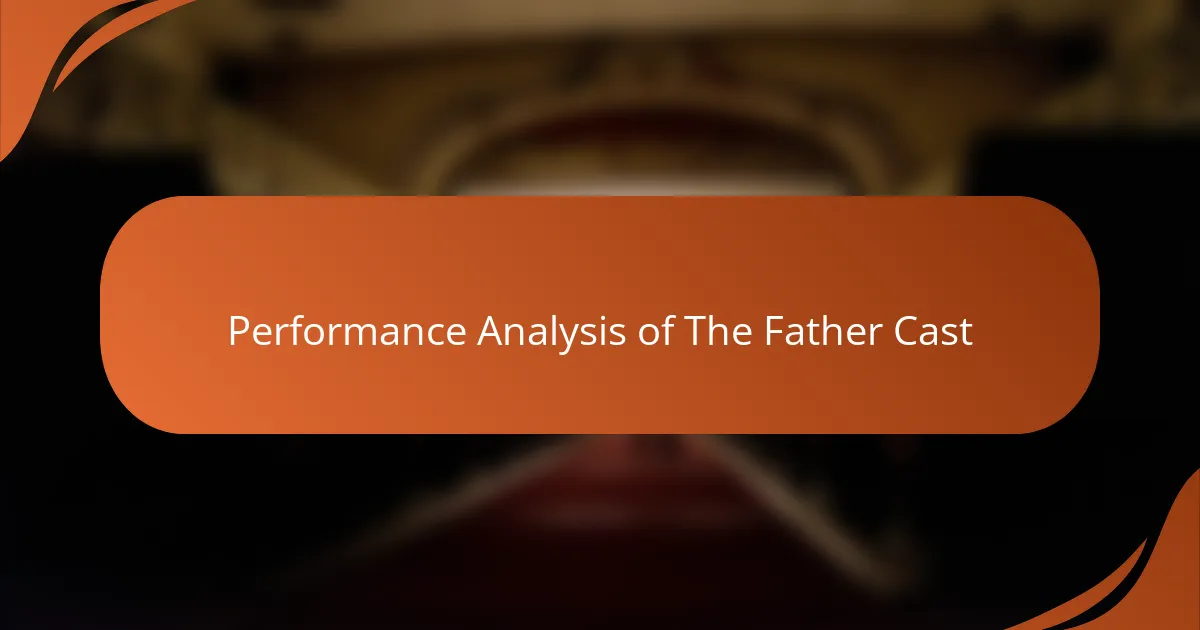
Performance Analysis of The Father Cast
Watching Anthony Hopkins in The Father, I was immediately drawn to the subtlety he brings to a character unraveling before our eyes. His performance isn’t just acting—it feels like living the experience of confusion and vulnerability, which, in my opinion, makes the emotional impact incredibly powerful. Have you ever seen an actor so fully disappear into a role that their presence feels both familiar and profoundly new?
Olivia Colman and the supporting cast provide a delicate balance to Hopkins’s portrayal, offering moments of tenderness and frustration that felt genuine to me. Their interactions aren’t merely scripted exchanges; they capture the real-life complexities of caring for someone losing touch with reality. I found these performances added layers that deepened my empathy for everyone involved in this heartbreaking journey.
What struck me most about the ensemble was their ability to convey shifting dynamics without over-explaining. Sometimes, in scenes charged with unspoken emotions, I caught myself holding my breath, sensing the characters’ pain beneath the surface. It made me wonder: how often do we overlook the silent struggles in our own families? This cast’s nuanced work reminded me just how vital those unspoken moments are in storytelling.
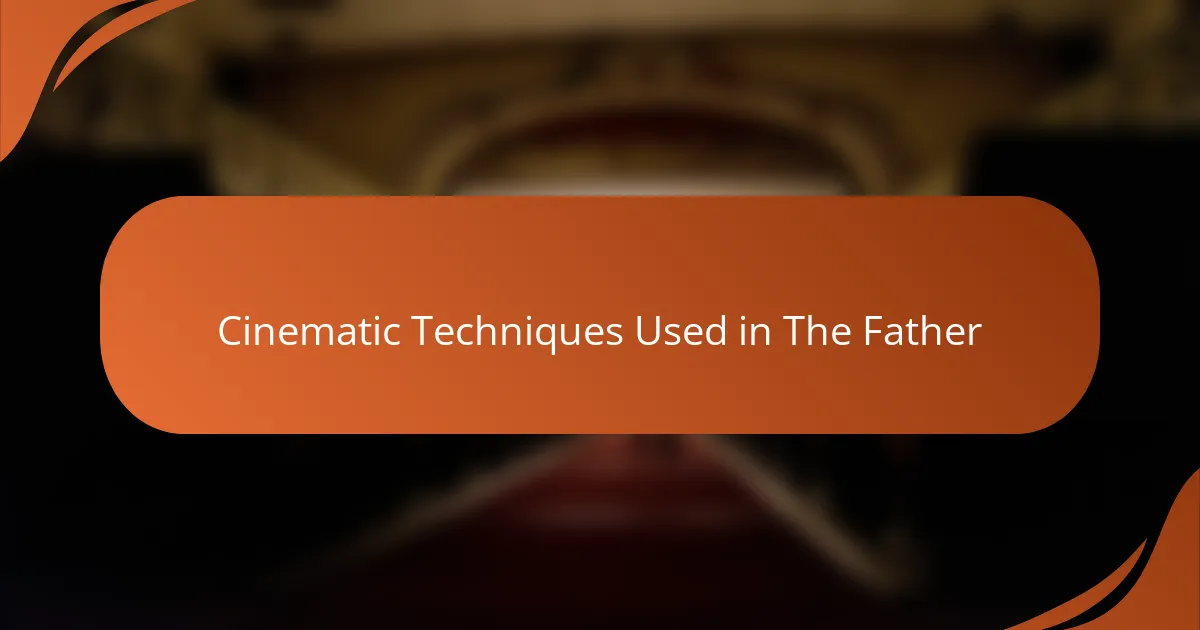
Cinematic Techniques Used in The Father
One of the cinematic techniques that truly stood out to me in The Father is its inventive use of spatial disorientation. The film subtly alters the layout of the apartment throughout scenes, shifting doorways and furniture placement to mirror the protagonist’s confusing mental state. Have you ever felt lost in a familiar place? That sense of unease was crafted so cleverly on screen that I found myself questioning what was real alongside the character.
I also appreciated how the editing plays a crucial role in reflecting memory loss. Scenes overlap, repeat, or jump unexpectedly, creating a fragmented timeline that draws you into the chaos of dementia. This approach isn’t just a stylistic choice—it invites the audience to experience firsthand the disjointed nature of fading memories, which felt deeply immersive to me.
Lighting and close-up shots enhance this immersive effect further. The dim, often claustrophobic lighting contributes to a feeling of isolation, while tight frames on Anthony Hopkins’s face capture every nuance of his shifting emotions. I remember feeling an intense connection to his character during these moments, as if the camera were a silent observer of his inner turmoil. Doesn’t this kind of intimate filmmaking make us more empathetic viewers?
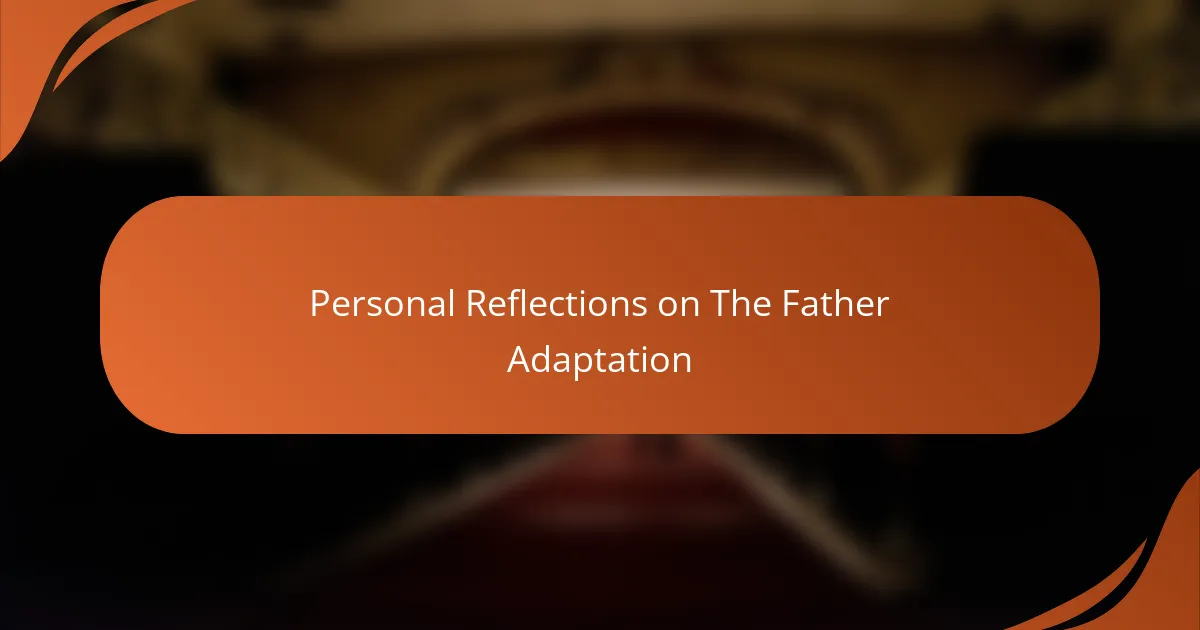
Personal Reflections on The Father Adaptation
Reflecting on The Father adaptation, I was deeply moved by how it made me confront the fragility of memory in such a raw, intimate way. It reminded me of a time when I struggled to communicate with an elderly relative, and suddenly the film’s portrayal felt personal and painfully close. Have you ever experienced that moment when art becomes a mirror to your own life, making you rethink what you thought you understood?
What struck me most was the film’s ability to evoke empathy not just for the protagonist but also for those around him. Watching their patience and exhaustion unfold felt incredibly real—I found myself reflecting on the emotional toll caregiving takes, something I hadn’t fully appreciated before. Doesn’t it make you wonder how many untold stories of love and loss happen quietly every day?
Lastly, I admired how The Father didn’t shy away from discomfort yet never felt exploitative. There’s a delicate balance in showing decline without reducing a person to their illness, and in my view, this adaptation achieved that beautifully. It left me pondering how cinema can give voice to experiences that are often isolating, offering a shared space for understanding and compassion.
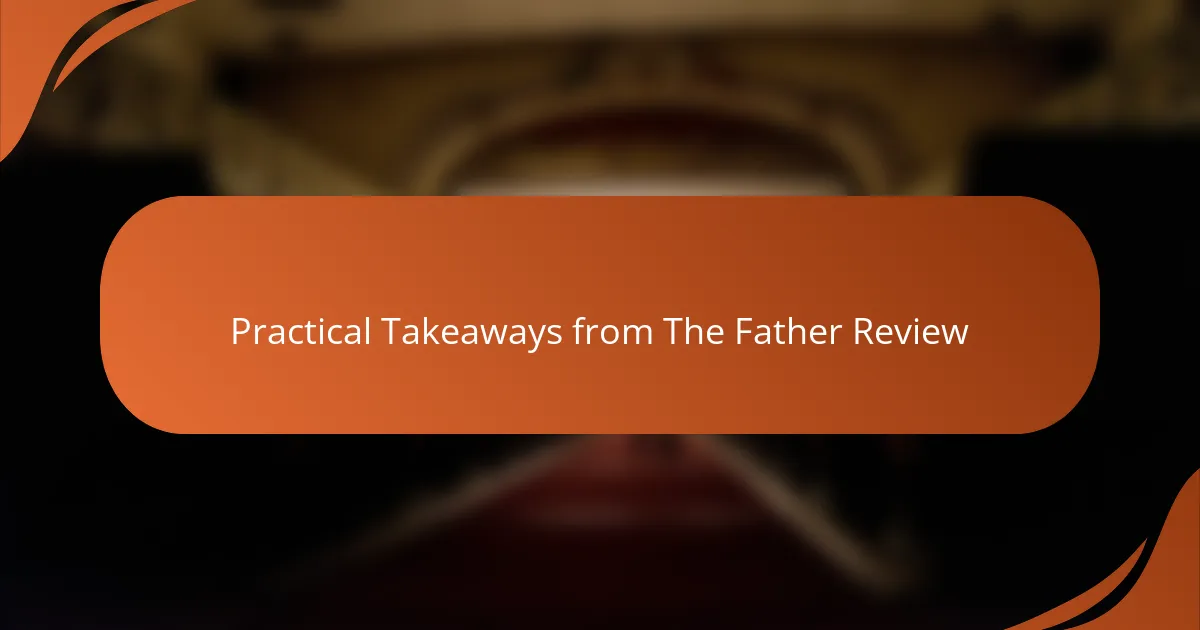
Practical Takeaways from The Father Review
When I think about practical takeaways from The Father review, one thing that stands out is how important it is for films tackling complex subjects like dementia to foster empathy. This adaptation reminded me that portraying vulnerability authentically can open viewers’ hearts in a way that mere facts never could. Have you noticed how a character’s emotional journey often teaches us more than a straightforward explanation ever would?
Another lesson I took to heart is how cinematic techniques—like disorienting spatial shifts or fragmented editing—can serve a greater purpose than just aesthetics. These choices aren’t just creative flair; they immerse the audience in the protagonist’s experience, making abstract struggles tangible. I find that this approach challenges filmmakers to think beyond traditional storytelling and consider how form can reinforce content meaningfully.
Finally, the performances in The Father demonstrated to me the power of subtlety and restraint. Watching Anthony Hopkins inhabit confusion and clarity with equal conviction reminded me that sometimes, less is more when it comes to evoking deep emotional responses. Isn’t it fascinating how silence or a brief glance can communicate so much more than dialogue? This review has made me appreciate how thoughtful adaptations can elevate an already powerful story by paying close attention to these nuances.